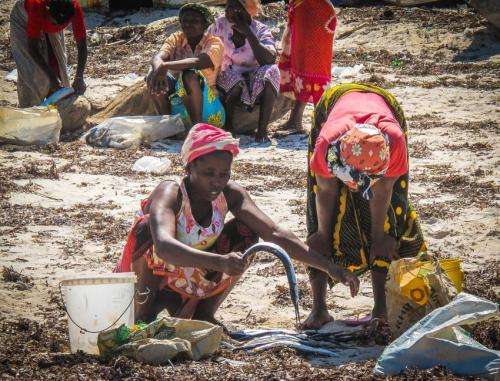Study provides insights on protecting world's poor from climate change

The worst impacts of climate change on the world's poorest fishing communities can likely be avoided by careful management of the local environment and investing in the diversification of options for local people, according to the Wildlife Conservation Society and James Cook University.
Climate change is already putting pressure on fishers who depend on nature for their livelihoods. In a new study, scientists found large differences in the potential to adapt based on the local mixture of social and environmental characteristics, requiring a variety of management approaches for each situation.
The paper appears today in the online journal PLOS ONE. The authors include: Joshua E. Cinner, Cindy Huchery, Nicholas Graham, and Christina Hicks of the ARC Centre of Excellence for Coral Reef Studies, James Cook University; Emily Darling of Simon Fraser University and Austin Humphries of Rhodes University; Nadine Marshall of CSIRO; and Tim McClanahan of the Wildlife Conservation Society.
The study undertaken by an international team of scientists, focused on 12 poor fishing communities along the coast of Kenya - a poor country that has been identified as one of the most vulnerable to the impacts of climate change. The scientists found that, even among the poor, there were considerable differences in how climate change was likely to affect the communities based on the existing social conditions and how each community cared for its marine resources.
"Despite the fact that all of the communities we studied were geographically close, they were vulnerable in very different ways," said lead author Dr. Joshua Cinner. "Some communities really lacked the assets to invest in new opportunities; others lacked the diversity of livelihood opportunities and skills to make a change, while some lacked the social networks and connections that people can rely on in times of need."
The team also looked at how the local coral reefs were holding up to a changing climate. "There are a number of studies that look at how climate change will affect either ecosystems or society, but in this study we really brought both of these together to get a more complete picture" says co-author Dr. Tim McClanahan, a Senior Conservation Zoologist from the Wildlife Conservation Society. "We conducted rigorous studies of reef ecology, the types of fish people were catching, and local socioeconomic conditions." Consequently, the study provides the most detailed and comprehensive examination of both social and ecological aspects of climate change impacts on coral reef fisheries to date.
The authors noted that climate change is already exerting significant pressure on the fishing communities of coastal Kenya; the 1998 El Niño Southern Oscillation resulted in widespread coral mortality along the coast. In areas where overfishing was rampant, communities lacked the potential to recover quickly from disturbances. These same areas tended to have fish species that were more sensitive to coral loss than areas that were protected from fishing by local communities and the government.
Overall, the authors found that communities and coastal managers can find ways of reducing the impacts of climate change on fragile coral reef ecosystems. Just as important, the authors maintain, will be formulating adaptation solutions combining ecological and socio-economic factors.
Journal information: PLoS ONE
Provided by Wildlife Conservation Society




















